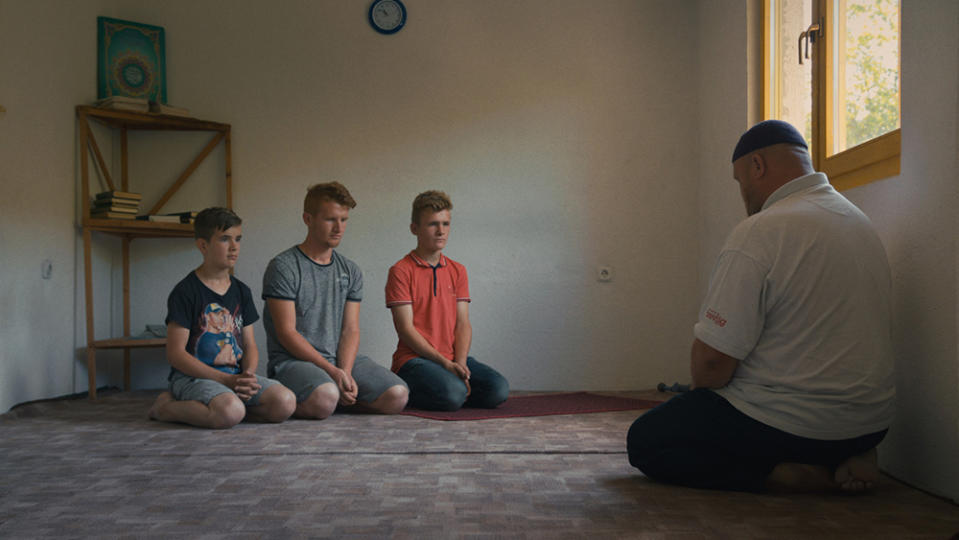‘Brotherhood’ Helmer Francesco Montagner Will Continue to Explore Masculinity, Whether It’s Positive or Toxic

FAMU graduate Francesco Montagner is following his win at Locarno with another trophy: the title of the best film in Ji.hlava’s Czech Joy section. “Brotherhood” was also noticed for its cinematography courtesy of Prokop Souček, called “one of the best cinematographers of his generation” by the jury.
A Nutprodukce production, it was made in co-production with Nefertiti Film and Rai Cinema, Arte G.E.I.E., Czech television and Al Jazeera Documentary. Deckert Distribution is handling the sales.
More from Variety
'Frontline' Exec Producer Raney Aronson-Rath on YouTube, Representation and Narrator Will Lyman
Louis Hothothot's 'Four Journeys' to Open IDFA; International Competition Lineup Revealed
Emerging Documentary Producers Present Their Projects at Ji.hlava Film Festival
Focusing on three teenage sons of a radical Salafist preacher, sentenced to two years in prison for his involvement in the Syrian war and terrorism, the Italian director set out for the Bosnian mountains after catching a glimpse of the family in a 2015 reportage.
“The boys’ father was trying to get some media exposure and possibly influence his public image before the trial. We expected that he would be sentenced, however, that he would have to pay for what he has done in Syria, although I am no judge. We wanted to see what would happen next,” he says.
“We don’t necessarily see him as a victim but he is the victim of war. All this trauma and hatred has stayed with him and keeps transferring from one generation to another. But these boys want to challenge it.”
Montagner ended up accompanying Jabir, Usama and Useir for a few years, witnessing them try to live according to their father’s wishes, at the same time realizing that the rules of their strict religious enclave might not be for them.
“They were longing for some human contact,” he says about his protagonists, admitting that part of his job had to do with bypassing their initial shyness.
“They are growing up in this very masculine world. You just don’t share your feelings. They try to suppress their own emotions, to be tough like their father and other shepherds around them. Our camera and our participatory way of working allowed them to say what they wanted. I noticed so much frustration in this community, this sense of being stuck. They lack the motivation to really change and improve.”
While the boys were able to experience a secular alternative thanks to their school and social media, opening up their isolated world, future escape won’t be easy, says Montagner, convinced that the environment you are born into determines the way you are.
“Your father’s personality, his faults, will always follow you. No matter how far you run, it will still be there somewhere. There is a certain kind of sadness to them,” he observes.
“Staying with them was beautiful because they are beautiful people, but it was hard to see them struggle, to see Usama turning from a sweet little boy into a rude, brutal young man. We can see in the film how lost they were during that time, looking for a guide.”
Montagner never wanted to focus on just one character in the film, he states, interested in the brothers’ ever-changing dynamic and the innocence of the youngest, Useir, slowly leaving his childhood behind.
“The concept of ‘brotherhood’ is very important in Islam and I felt the need to represent all of them. In these communities, family bonds are so strong,” he says.
“They saw me as this young guy, not much older than them, a complete foreigner to their world and religion, and all these complicated political dynamics. Me and my crew, we became a part of their little universe, their older brothers who play with them, listen to them, smoke with them,” adds the helmer, himself born in 1989.
“Because of my youth, I related to this feeling of frustration, of being stuck and wanting to break free. Now, I will continue to explore masculinity, which is a very interesting topic for me, whether it’s positive or toxic. I am attracted to places which are both a paradise and a prison.”

Best of Variety
Sign up for Variety’s Newsletter. For the latest news, follow us on Facebook, Twitter, and Instagram.

